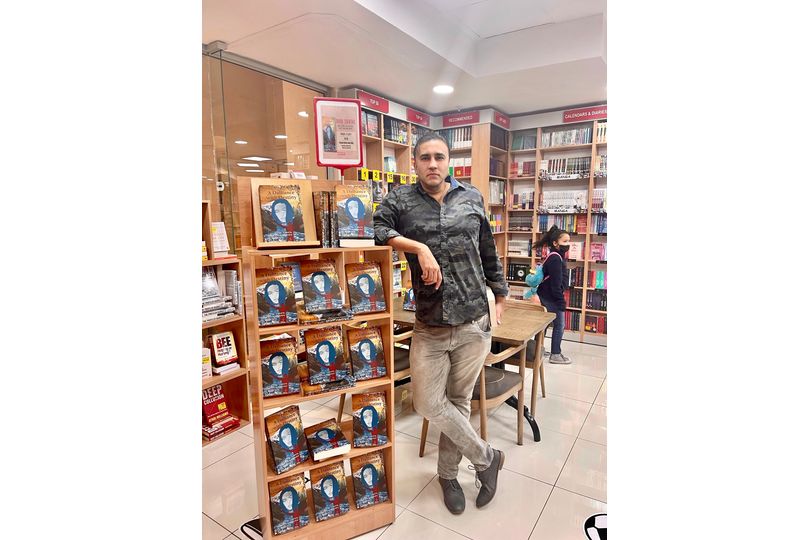Interview with Aman Singh Maharaj, Author of "A Dalliance of Destiny"
on Jul 27, 2022

Born in 1973, Aman Singh Maharaj primarily lives in Durban, South Africa with a large extended family, in a home overlooking the picturesque Indian Ocean. Also spending a considerable amount of time in India, annually, he considers himself a nomad, travelling the world. Taking an avid interest in anthropology, he never ceases to be enthralled with the sheer kaleidoscope of cultures, diversity and architectural marvels that the world has to offer.
Having first graduated with an honours degree in structural engineering, he continued with an MBA and then a PhD in Development Studies, working in a multitude of diverse professions before finally choosing to become an entrepreneur. Quite enamoured by the concept of ‘magical realism’, he also decided to enter the literary realm.
He also writes articles on various subjects for national newspapers, focusing mainly on the Indian Diaspora, but he has now also forayed into more culturally generic topics.
Frontlist : Your story revolves around a protagonist who pushes the limits of sanity and materialism to pursue a higher spiritual goal. Is there a connection between the character and any real-life individual?
Aman: To be totally honest, I wholly believe that all writers put a bit of themselves into their characters, as that’s the way ego works. However, in the case of my book, I hyped up the negative traits of the characters by putting it on steroids. So the similarities become very stretched, almost impossible to determine.
Frontlist : Your book discusses humour, sanity, materialism, and fluctuating emotions. What was your primary purpose or message with this book?
Aman: Ultimately, it is as the title suggests. Who is in charge of one life path? Is it the individual or fate itself, or some sort of combination of the two? The novel examines the possibilities of free will versus some sort of fixed kismet.
Frontlist : Why did Milan Gansham, the protagonist of your story, decide to travel to India on a mystical journey with his unusual best friend, Birju?
Aman: Milan has been through a series of distressing experiences, some not of his own knowledge as to why, and it all leaves him feeling lost and disheartened. Added to that, he receives synchronistic signs that maybe going to India will save him from the extreme angst he seems to be undergoing.
Frontlist : Why is Milan at odds with the rest of the democratic world while everyone else celebrates their country's euphoric entry into it?
Aman: When South Africa came out of apartheid in 1994, and under the stewardship of Nelson Mandela, there was a tremendous sense of patriotism and hope, which had begun to wane with Mandela’s end of his presidency, when kinks had begun to show in the ruling party. So, whilst the rest of the world celebrated South Africa’s relatively bloodless transition to democracy, Milan feels there are deeper, negative forces at play that is not visible to the globe.
Frontlist : Grant Road was Bombay's notorious red light area. What would you like to say about it and the different types of people living in those areas?
Aman: I remember walking through Grant Road for the first time at night, around 1996. It was very distressing for me. There were moments of silliness, with hijdas pulling my then long hair, but seeing 10 year old Nepali girls standing in stalls, peeping from behind curtains, made my tummy churn.
Frontlist : You were captivated by the concept of 'magical realism,' and you later decided to pursue a career in literature. What was the main reason for it?
Aman: I have always loved the idea of bringing in an ethereal dimension into literature, not so much that it loses its ethos of being contemporary fiction, but just enough to highlight that there are a number of different forces, beyond our own realm of vision, that plays a role in influencing our lives.
Frontlist : What was it like for you to write this book, and has anything in particular influenced you?
Aman: Well, there were great moments, good moments, bad moments, and terrible moments. When the creative juices flowed, it was simply wonderful to pound away at my keyboard. But, when I sometimes read my provocative words, then I will get anxious about the possible reactions in the public realm. So, in essence, it was a multitude of contradictory emotions that I underwent. In terms of what influenced my writing, well, maybe growing up in a small town in the Eighties, with not much access to entertainment, made me turn to reading as a source of amusement, which was also augmented by my mum taking me to the municipal library at a very early age.



.jpg)






.jpg)

.jpg)
.jpg)
.jpg)
.jpg)
.jpg)
.jpg)










Sorry! No comment found for this post.